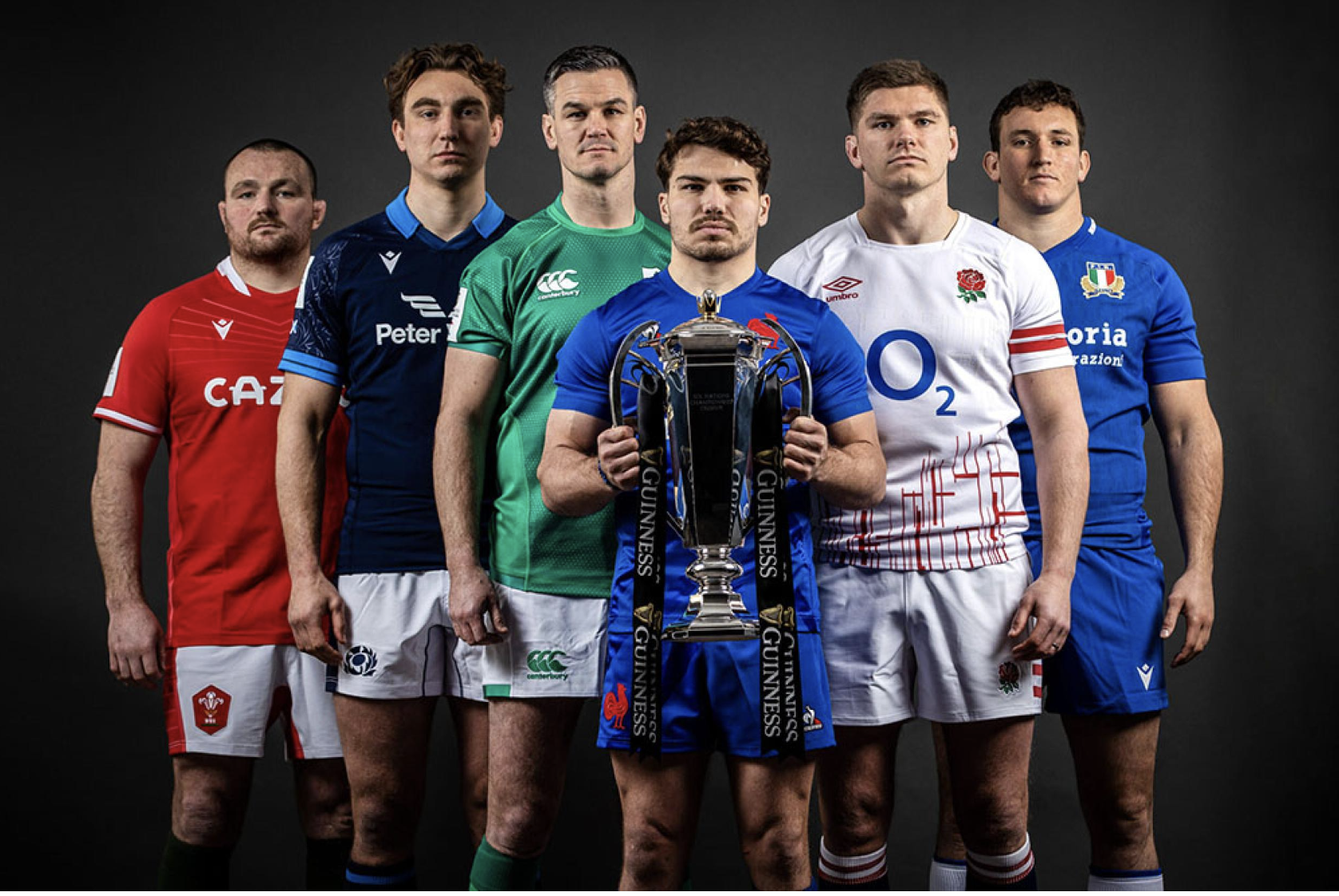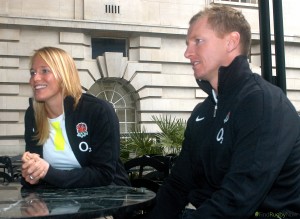
Michalea Staniford and Barry Maddocks chat with FRN at the London Marriott Sevens Launch
This weekend’s Marriot London Sevens sees the English women’s rugby sevens team compete alongside the men at Twickenham Stadium for the first time for the last leg of the HSBC Sevens World Series.
There is no doubt that the women’s team profile has greatly improved since the announcement that the rugby sevens is to become an Olympic sport.
The team has worked hard to build their reputation and prove to everyone, including their male counterparts, that they are worthy of being classed as rugby professionals. The team train like professionals and are expected to perform like professionals, yet these ladies hold down full-time jobs and are not paid to compete at the highest level of their sport.
FindRugbyNow goes directly to the source – Captain Michaela Staniford, Women’s Rugby Sevens Coach Barry Maddocks and former Captain Sonia Green – to find out: What is it like to be an England women’s sevens rugby international?
We get to the heart of the following issues: (1) Development, (2) Daily Lives, (3) Training, (4) RFU Support, (5) Change to Professional Status, (6) Olympic Influence, (7) Tournament Exposure, (8) Relationship with Men’s Team, (9) The Overlap Between 15s and 7s and (10) Marriot London Sevens.
Development
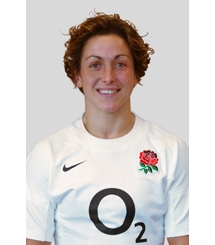
Sonia Green. Photo from RFU.
Although the Sevens squad is composed of women that started playing rugby at different stages of their lives, it is obvious that they are all exceptional athletes with a passion for rugby. Green started playing rugby when she was at school, and within a year of playing for her local club she was recruited into the England set-up to play for England-U19s. She worked her way through the system through U19s, the Academy, and England A’s before she was chosen for the Senior squad.
“I’ve sort of proved to everyone that the system actually works and the development pathway that they have in place is effective because I have been in the system now for about 8 years.”
Like Green, Staniford started playing while she was at school and quickly realised that she had a gift for the sport. “I picked it up more than any other sport…I had a real passion and loved everything about it,” she said.
It is this passion that keeps the girls going through all of the difficulties of playing a professional sport. “First and foremost, you want to put on an England shirt and no matter how much hard work it is, when you get to then play in front of 40,000 people or 95,000 [like this weekend], it makes it worth it. But it is hard work”, Green said.
Daily Lives
The reality is that because the women are not paid as professional players, they all need to work full-time whilst abiding by a very rigorous training picture. This means that they must choose professions that are flexible and employers that are understanding of their need for time off during tournament season . They also need support from the RFU.
“Most players, without their employer’s support, wouldn’t be able to cope,” Green said, “so for example, I am a teacher and when I have to take time off for tournaments the school where I work in London has to get a cover teacher in. The RFU are very supportive and they pay for my school whilst I’m off to enable them to get a cover teacher in and help support financially. But I myself don’t actually get any funding for that. It goes directly to my employers.”
Many of the England players (along with many others who play at a high level for their clubs) must put their career aspirations on hold while they play for England. Although there are some exceptions like Joanne Watmore who works as an accounts clerk (for her father’s company), most of the girls are students or work as teachers or as coaches/in other roles for the RFU/RFUW so that they can have flexible schedules.
“I know that for me I chose teaching because obviously I enjoy working with kids but also because I knew it would fit in well whilst I was playing rugby. At the moment while my focus is on my rugby career it works well,” Green said. After her rugby career, Green said she may look into her options.
Training
It appears that the biggest difficulty that the girls have is juggling their work commitments, their rugby training schedules and their personal lives (although I am not sure these exist outside rugby).
How do they keep to a rigorous training schedule while working?
“We basically have to get up early, train before work and then work all day and then go to another training session after work,” Green said, “some days I don’t get home until 10 o’clock at night [and then I have to] do planning and marking for the next day at school.”
Outside Tournament Time
Outside of tournament time, the women have a very rigorous training schedule that is set for them by their Strength and Conditioning Coach. A sample week for a player would be as follows:
- 2 speed/sprint sessions, which players are expected to do on an athletics track
- 2 weight sessions, which could be a mixture of power and strength depending on the time of the season, to be done at the gym
- 2/ 3 fitness sessions working on anaerobic/aerobic fitness that can be done at the gym or at a park or rugby field
- 1 skill session to be done on their own or with a partner at the gym
- 2 club rugby sessions in the evenings (players must all play 15s for a club)
- 1 rugby match for their club on weekend/if no club match, the squad comes together for training with the England players/if no club rugby or England training, the women will have a regional session with the England coaches and the other squad members in their region (e.g. all of London girls train together, all of the West country girls might go to Bristol, so it depends on where you live)
During Tournament Time
Since the girls are only able to train together every couple of weeks, tournament preparation time is minimal but effective. Maddocks said, “We don’t have the opportunity to train every day. It’s very much like we’re in camp for four days, and then we’ve got to play the tournament. That’s how it works at the moment.”
But Maddocks and the coaching team make the time that the women have together count by studying their opposition and focussing on getting the basics right. “It’s about making sure that our basics are correct. In a game plan, we look at the different opposition. As the tournaments go on, things may change as the opposition may try something different, so that will really be the preparation for this week.”
RFU Support

Green stressed that without the support of the RFU, they would not be able to get the professional training that the players desperately need. “The funding from the RFU means that we get support from EIS, which is England Institute of Sport, and that means that we can go to…an EIS hub that is near where we live. ..[These hubs] have our strength and conditioning coaches there, our physios there, sports nutritionists, sports psychologists. We can access that during the week.”
Green said that the RFU was extremely helpful when she broke her leg before the last World Cup and helped her get the very best treatment. She was back in action after only 9 months of rehab. “I had fantastic medical support thanks to the RFU. They supported me 100% and they made sure I had the best surgeon and physios when I broke my leg.”
Change to Professional Status
The England men’s squad currently have 12 professionally paid players with the aim of expanding to 20 players. Other countries, including the USA and the Netherlands, have started paying for their women’s sevens squad to train professionally, but the RFU has been quiet on the subject. When asked whether there has been any behind-the-scenes talk about the women being paid professionally, Green said that there isn’t anything official.
“All that we are focussing on at the moment is that we are lucky to be involved in more tournaments and next year there is the view to the World Series having more tournaments that we are going to be able to go to,” Green said, “That will hopefully increase sponsorship.”
Despite the lack of professional status, the players are highly optimistic about the team. “At the moment there is nothing in place for us to go professional, but, as you can see, despite that we are still going to tournaments and doing extremely well getting into the final in Dubai and winning in Hong Kong”, Green said.
Green said that she believed the RFU is coping as well as it possibly can without having any women’s contracted players like the men’s squad.
Olympic Influence
Despite the players not being paid professionally yet, both Staniford and Green said that they have seen a big difference in reception towards women’s sevens rugby since it was announced that sevens will be incorporated into the next Olympics.
“The training has increased, the amount of coverage that we’re getting, the support from the men’s team, everything about it has improved now that people appreciate that it is a sport that is going to be an Olympic sport and potentially [an opportunity] to represent [the] country,” Green said.
Tournament Exposure
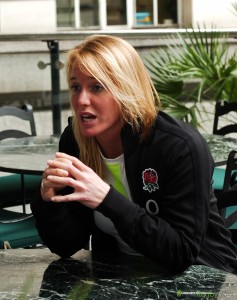
Staniford talking to FRN at the Marriot London Sevens Launch
Both Staniford and Green stressed the importance of having the opportunity to play in tournaments, which not only provide an opportunity for the squad to gain experience playing together, but also provides important exposure that can lead to further sponsorship opportunities for the team.
“In the future, there is obviously scope for players going part-time and the more tournaments that happen like this weekend, the more sponsorship we’ll get, which hopefully will mean that in the future there will be more money in the women’s game”, Green said.
Staniford said that after the London Marriot Sevens, the team is looking forward to the Grand Prix in Amsterdam and then the World Cup Qualifiers in Moscow in the summer.
“It’s positive because the Women aren’t in as intense an environment as the men – every time we come into camp, we look forward to it. We maximize our time…we enjoy spending time with each other, we look forward to working with our coaches, staff, analysts…we’re hungry for that information. We still want to learn… we want more. It’s really refreshing in that respect”, Staniford said.
Tournaments also provide a good opportunity for the players to spend time together. “In sevens, because you only have a small group of players, you are pushed to your limits every game. It’s a very close-knit environment. We’re all very good friends. We all read each other and balance well off each other. So when it comes to team building we do that automatically. We spend a lot of social time together, and we enjoy each other’s company. I think the girls would love more time together in a training environment, but at the moment we have a good balance. Hopefully it shows on the pitch”, Staniford said.
Relationship with Mens Team
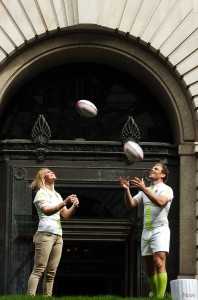
Michaela Staniford and Rob Vickerman at the Marriot London Sevens Launch
High profile tournaments have also provided the team with an opportunity to showcase their skill to the fans and their counterparts in the English squad, which had helped to build respect for the squad and forged closer relations with the men’s squad.
“Since we are getting to go to the same tournaments [as the men’s team], we are getting to actually meet the guys now”, Green said.
“It’s been really nice to have contact with the men’s squad”, Staniford said, “Some of us are a bit star-struck. To know that they’re actively watching and encouraging us is really nice. As individuals and as a team it means a lot that people who spend their lives playing rugby (professionally) can appreciate what we do.”
“The thing that really helped improve the men’s [perception] of us [happened] in Romania at the Euros last year. It was the first tournament that the men and women had [played] alongside each other and the England men came and watched our games. A lot of them actually said, “Wow, if we’re honest, we’ve seen women’s rugby before and we weren’t that impressed, but we just watched you guys play and wow, you can play sevens. They were so impressed that for the rest of that weekend they came and supported us.”
Playing alongside the men’s clubs has also helped build the women’s reputation. “[Romania] was the first time we were in the same kit…the tequila sunrise kit, and that really helped with the crowd because obviously we had that identification with the men.”
Following tournaments where the women have played alongside the men, friendships have been forged between the two teams. “There have been things like twitter and facebook and we have been able to keep in contact more”, Green said, “And [the men have been] really supportive this week – we’ve had texts and tweets giving us support – even things like helping out with coaching kit and training kit – some of the girls [also] train in Twickenham gym and have fitness sessions with the men.”
“What was also great, is that we had a media day at Twickenham a few weeks ago and what was fantastic was that not only the players but the men’s coaches were really supportive and they put that across to the media”, Green said.
“[The men’s coaches mentioned] things like when we bought a GPS system in Dubai and it actually showed that we covered as much distance when we’re playing as the men. We don’t hit quite the same top speeds as the men do, but that really impressed the coaches.”
“They said that they know that we work just as hard as the men on the pitch…if not harder because [we] all have full-time jobs, unlike most of the guys that might be part-time or don’t have jobs at all.”
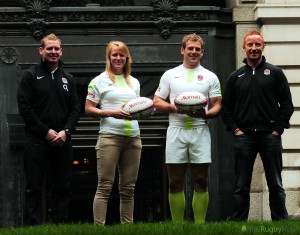
The England Sevens Coaches and Mens and Womens Captains
“That helps, because if you’ve got the England coach saying how impressed they are with us, that really helps with the support. So, I can only say positive things about going to the tournaments with [the men’s team]. It’s been fantastic”, Green said.
Although the two teams train separately at the moment Green said that there are plans in the works to train with the men in the future.
“The [men’s] coaches have said that is something they want to do in the future and they would be happy to work closely with our coaching team and ensure that we have some sessions where we would work together because it would be beneficial for everyone involved,” Green said, “Financially and logistically it probably makes sense to have everyone in one place, so it works quite well.”
Maddocks said that there has not been very much input from Ben Ryan, the England Mens Head Coach yet, but from now on there will be a lot more involvement. “Ben’s really keen on making a unified coaching group, rather than, ‘Ok, here are the men’s, here are the women’s’”, Maddocks said, “When we’re away, we might have brought along an analyst and they haven’t… and in these instances we’ve helped each other before. I can only see that relationship going forward and improving quite considerably.”
The Overlap Between 15’s and 7’s
Inevitably, some of the sevens team players still overlap with the 15s game. England’s set-up currently has one Elite Performance Squad (EPS) that encompasses all the 15’s and sevens players. Some specialise in fifteens, some in sevens, and some cross over.
“We’ve only been recently put on an official circuit. So, at the moment, we’re still working out how it’s going to work for 15’s and sevens: we still have crossovers, we have players in the sevens that haven’t been capped for the 15’s, or who haven’t been exposed to much competitive rugby. They’re going out playing in front of 40,000 people, against international teams in Dubai and Hong Kong”, Staniford said.
How are these new/young players dealing with the pressure?
“It’s tough. But you can have a [good] balance of those players who have done it before and have the experience at that level. We kind of dip players in where Barry [Maddocks] feels they will be able to manage. It’s not sink or swim…We all train hard to [play at this level] and to be successful, but no matter how many times you [play], it’s still scary going out there in front of 40,000 people and having to do a job. [Ultimately,] the coaching staff prepares us. We train really hard as individuals and as a team”, Staniford said.
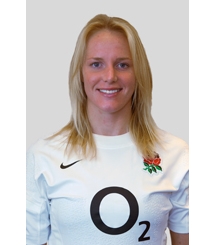
Michaela Staniford. Photo from RFU.
Staniford said that this transitional period had to do with thinking “As a nation, as England, where our priorities lie and at what times…So there is a crossover, but it also allows us … to expose more players to competitive rugby and…allows them to play at top level while still developing, while still meeting standards and achieving what we want to as English rugby”.
Still, others have chosen to specialise in sevens like Green, who has been focusing on her sevens game for the last four years. Yet, despite focussing on sevens on an international level, Green must still play 15’s for a club side (she plays for Saracens).
“There are a few players similar to me and the reason why some players play 15’s is because there have been a few injuries in the 15’s squad, so they have been brought over to the 15’s game to support the team…I think with the Euro this summer at the end of June/July and then the Sevens World Cup the focus will then be on sevens, so the players that have done both will focus only on sevens for England and after the Sevens World Cup with the 15s World Cup the focus might change slightly.”
Staniford is very positive about the development of womens sevens. “From where we were a couple of years ago, last year, our talent pool and our selection of players has massively increased its exposure to international competitive rugby. I’m expecting it’s only going to be positive”, she said.
Marriott London Sevens
Both Staniford and Green said that the team is looking good and is going into the tournament with no injuries. “We’re feeling fit and ready to go,” Michaela said, “It’ll be very exciting to see what we can produce at the weekend.” When asked whether we are going to see a repeat of Hong Kong, Green said,” Fingers crossed.”
For girls who are looking to progress and play at a higher level, Green recommends getting involved with sevens.
“Just get involved and get playing. That’s the important thing. That is how I started [playing] sevens. There are so many fun sevens tournaments that go on – whether it is playing for charities or whether it is playing for sponsored teams, there are many that women and girls can get involved with – from school all the way to adult level. Tournaments are [always a lot of fun] and usually run alongside men’s tournaments, so it is a really social atmosphere.”
“The more sevens you play the fitter you will get and the better understanding you will [have] of the game” Green said, “With the Olympics coming up, the RFUW have set up open sevens trials, so that is a fantastic [way] that [girls] can get involved in sevens.”
Many thanks to Sonia Green, Michaela Staniford, Barry Maddocks and Julia Hutton for their assistance with this article.
FindRugbyNow wishes the women’s team the best of luck for this weekend. We’ll have our fingers crossed for you. Please feel free to leave well wishes for the team below or comments on the article.
By: Ellaine Gelman








 When most people hear the word “Peloton” they think of an expensive black bike with shiny red buttons and that controversial commercial where the husband gifted his wife a Peloton for Christmas.
When most people hear the word “Peloton” they think of an expensive black bike with shiny red buttons and that controversial commercial where the husband gifted his wife a Peloton for Christmas.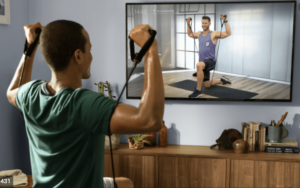 If the app interests you, Peloton is currently offering a 30 day FREE TRIAL, so why not give it a try? Check it out
If the app interests you, Peloton is currently offering a 30 day FREE TRIAL, so why not give it a try? Check it out 
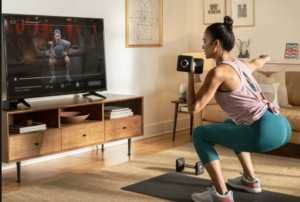
 This article would not be complete, however, if we did not acknowledge some of the delivery issues that have been plaguing Peloton over the last year. Most of the delivery issues seem to affect U.S. deliveries, however, the UK deliveries have been affected as well.
This article would not be complete, however, if we did not acknowledge some of the delivery issues that have been plaguing Peloton over the last year. Most of the delivery issues seem to affect U.S. deliveries, however, the UK deliveries have been affected as well.







